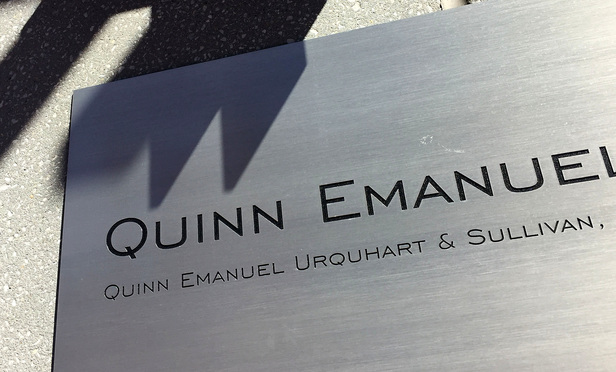Quinn Emanuel takes lead role on closely watched Barclays dispute over 2008 capital raising
US firm takes over from Fladgate on dispute over Barclays' controversial $3bn Qatar loan
October 02, 2017 at 11:09 AM
3 minute read
 Quinn Emanuel Urquhart & Sullivan has taken the lead role for private equity firm PCP Capital Partners on its dispute with Barclays over a controversial $3bn capital-raising exercise by the bank at the height of the 2008 financial crisis.
Quinn Emanuel Urquhart & Sullivan has taken the lead role for private equity firm PCP Capital Partners on its dispute with Barclays over a controversial $3bn capital-raising exercise by the bank at the height of the 2008 financial crisis.
The US litigation firm has taken over from City firm Fladgate, which was previously advising PCP with a team led by white-collar crime partner Bree Taylor.
Quinn London managing partner Richard East is heading up his firm's team now advising PCP, while Simmons & Simmons is acting for Barclays with a team led by London senior partner Colin Passmore.
The dispute dates back to 2008, when Barclays was looking to raise billions of pounds in capital and was in discussions with both PCP and Qatar Holding, then the bank's largest shareholder.
PCP was working with Sheikh Mansour, a member of the ruling family of Abu Dhabi, on a deal to join the syndicate of investors in Barclays.
In a claim filed this August in the Commercial Court in London, PCP alleges that Barclays acted dishonestly with regards to the different terms offered to Qatar Holding and PCP for participation in the capital raising.
The private equity vehicle claims that its reliance on Barclays' representations meant that it missed out on a windfall in potential fees or profits, and is claiming hundreds of millions of pounds in damages.
Allen & Overy took the lead role for PCP in 2008, while Clifford Chance acted for Barclays.
The court filing also claims that Linklaters pulled out of representing Barclays in 2008 because of concerns over the legality of the Qatar loan.
It states that Linklaters told Latham & Watkins, which was acting for the State of Qatar on the proposed loan, that "[so as to] seek to ensure that no financial assistance is being provided… the purpose clause should make it clear that the facility is being used for investments other than in Barclays".
It continues: "The Qatar Facility Agreement did not include any such representation," and "on the same day or the next, Linklaters declined to continue to act for Barclays in respect of the loan… It should be inferred that Linklaters resigned (at least in part) because it was concerned that the Qatar loan would be illegal, specifically that it would involve unlawful financial assistance by Barclays for the purchase of its own shares."
This June, it was revealed that Barclays and four of its former executives are facing fraud charges over the 2008 Qatari loan. The Serious Fraud Office announced that Barclays and the four individuals had been charged with "conspiracy to commit fraud and the provision of unlawful financial assistance".
This content has been archived. It is available through our partners, LexisNexis® and Bloomberg Law.
To view this content, please continue to their sites.
Not a Lexis Subscriber?
Subscribe Now
Not a Bloomberg Law Subscriber?
Subscribe Now
NOT FOR REPRINT
© 2025 ALM Global, LLC, All Rights Reserved. Request academic re-use from www.copyright.com. All other uses, submit a request to [email protected]. For more information visit Asset & Logo Licensing.
You Might Like
View All
Kirkland, Paul Hastings, White & Case, Freshfields advise on Top German Deals
2 minute read
Kirkland Steers Paris-based Antin in ‘Year’s Biggest’ Infrastructure Fund Closing, at €10.2B
3 minute read
Venezuela Faces Creditor Class Action Suit After Missing $1.5B Bond Payments
2 minute read
Top German Banking Partners Seiler & Rath Rejoin Latham After White & Case Stint
3 minute readTrending Stories
- 1Balch & Bingham Elects New Partners, Adds Litigator From Jones Walker
- 2People in the News—Jan. 16, 2025—McGuireWoods, High Swartz
- 3'Pushed Into Oncoming Traffic': $5.85M Settlement in Mediated Auto Tort
- 4The Marble Palace Blog: Supreme Court Books You Should Read in 2025
- 5Avoiding Legal Risks: Crafting a Strong Do Not Call Policy for Compliance
Who Got The Work
J. Brugh Lower of Gibbons has entered an appearance for industrial equipment supplier Devco Corporation in a pending trademark infringement lawsuit. The suit, accusing the defendant of selling knock-off Graco products, was filed Dec. 18 in New Jersey District Court by Rivkin Radler on behalf of Graco Inc. and Graco Minnesota. The case, assigned to U.S. District Judge Zahid N. Quraishi, is 3:24-cv-11294, Graco Inc. et al v. Devco Corporation.
Who Got The Work
Rebecca Maller-Stein and Kent A. Yalowitz of Arnold & Porter Kaye Scholer have entered their appearances for Hanaco Venture Capital and its executives, Lior Prosor and David Frankel, in a pending securities lawsuit. The action, filed on Dec. 24 in New York Southern District Court by Zell, Aron & Co. on behalf of Goldeneye Advisors, accuses the defendants of negligently and fraudulently managing the plaintiff's $1 million investment. The case, assigned to U.S. District Judge Vernon S. Broderick, is 1:24-cv-09918, Goldeneye Advisors, LLC v. Hanaco Venture Capital, Ltd. et al.
Who Got The Work
Attorneys from A&O Shearman has stepped in as defense counsel for Toronto-Dominion Bank and other defendants in a pending securities class action. The suit, filed Dec. 11 in New York Southern District Court by Bleichmar Fonti & Auld, accuses the defendants of concealing the bank's 'pervasive' deficiencies in regards to its compliance with the Bank Secrecy Act and the quality of its anti-money laundering controls. The case, assigned to U.S. District Judge Arun Subramanian, is 1:24-cv-09445, Gonzalez v. The Toronto-Dominion Bank et al.
Who Got The Work
Crown Castle International, a Pennsylvania company providing shared communications infrastructure, has turned to Luke D. Wolf of Gordon Rees Scully Mansukhani to fend off a pending breach-of-contract lawsuit. The court action, filed Nov. 25 in Michigan Eastern District Court by Hooper Hathaway PC on behalf of The Town Residences LLC, accuses Crown Castle of failing to transfer approximately $30,000 in utility payments from T-Mobile in breach of a roof-top lease and assignment agreement. The case, assigned to U.S. District Judge Susan K. Declercq, is 2:24-cv-13131, The Town Residences LLC v. T-Mobile US, Inc. et al.
Who Got The Work
Wilfred P. Coronato and Daniel M. Schwartz of McCarter & English have stepped in as defense counsel to Electrolux Home Products Inc. in a pending product liability lawsuit. The court action, filed Nov. 26 in New York Eastern District Court by Poulos Lopiccolo PC and Nagel Rice LLP on behalf of David Stern, alleges that the defendant's refrigerators’ drawers and shelving repeatedly break and fall apart within months after purchase. The case, assigned to U.S. District Judge Joan M. Azrack, is 2:24-cv-08204, Stern v. Electrolux Home Products, Inc.
Featured Firms
Law Offices of Gary Martin Hays & Associates, P.C.
(470) 294-1674
Law Offices of Mark E. Salomone
(857) 444-6468
Smith & Hassler
(713) 739-1250








